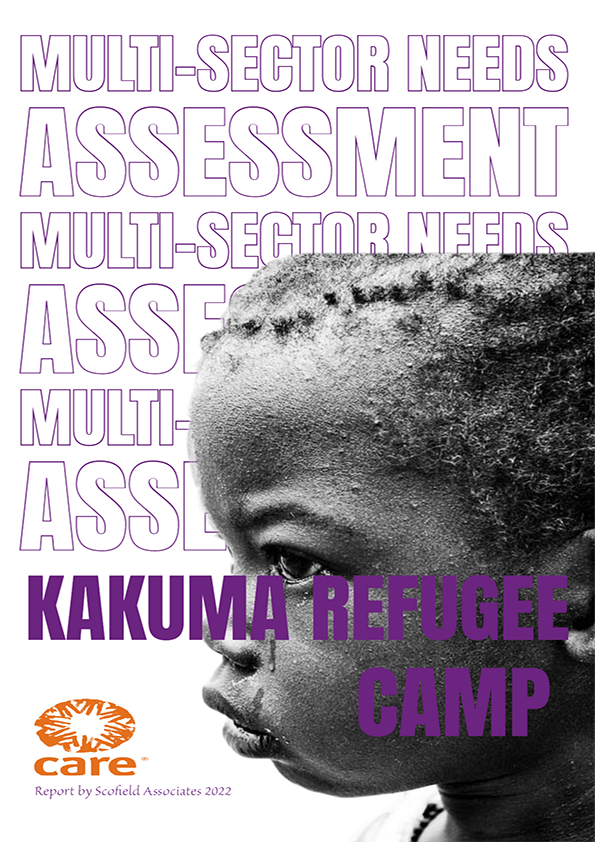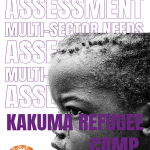
Multi Sector Needs Assessment Report - Kakuma Refugee Camp, July 2022.
Reports
July 31 , 2022
Executive Summary
The Executive Summary of the Multi-Sectoral study on Kakuma provides an in-depth analysis of key aspects within the humanitarian landscape, aiming to comprehensively assess the current state and potential avenues for effective interventions. As a result of its relative stability, Kenya has taken on the responsibility of addressing the refugee crisis in the Horn of Africa.
The primary objective of this assessment is to offer an empirical overview of the evolving humanitarian needs within the Kakuma camp, with a specific focus on enhancing service accessibility. Additionally, the study seeks to foster evidence-based collaboration with humanitarian sector stakeholders in the camp, bolster advocacy efforts, and contribute to more robust planning and implementation of both emergency and long-term initiatives.
To achieve these goals, a rigorous data collection process was undertaken, encompassing a blend of secondary and primary data sources. This involved comprehensive household surveys, enriched by qualitative key informant interviews and enlightening focus group discussions. A sample of five hundred and twenty-eight households was meticulously chosen, revealing a dominant male presence at 60%, a female population of 39.6%, and 0.4% identifying as intersex. Notably, among the interviewed women, an impressive 34.4% held the significant role of household heads, highlighting their central authority within their families.
Although certain sector findings displayed uniformity throughout the entire camp, variations were observed among different villages. However, a consensus emerged regarding the heightened vulnerability of women and girls to gender-based violence, with a notable emphasis on the unique needs of lactating mothers.
A noteworthy concern within Kakuma relates to mental health, particularly affecting males more than females. While instances of violence were identified, there is a pressing need for a more nuanced understanding of the concept, as actions perceived as minor transgressions might contribute to deeper issues of physical and emotional abuse.
The reporting of violence displayed divergence among stakeholders, with Kakuma standing out for underreporting among civil society and donor organizations. Furthermore, the absence of effective coping mechanisms is evident. To address these gaps, the study proposes modern approaches, including legal aid and alternative dispute resolution, to augment traditional conflict resolution methods and law enforcement.
The study identified cultural biases impacting education access, leading to practices such as early marriages. To address this challenge, multifaceted strategies rooted in cultural considerations, infrastructural enhancements, and localized education policies are essential to improve enrollment, retention, and successful transitions.
An interesting divergence emerged between refugee priorities and the focus of humanitarian efforts. Notably, registration and toilet availability ranked lower than essentials like water, food, and resettlement. The study highlights the need for a novel strategy that ensures essential services are provided before registration due to the continuous influx of new arrivals.
Despite possessing employable skills, refugees encounter regulatory obstacles hindering income-generating activities. Empowerment programs must align with market realities and focus on sustainable livelihoods beyond the camp to maximize impact.
Furthermore, limited access to financial services hampers refugees’ potential, contributing to debt stress. The lack of insurance services compounds challenges, and reliance on family support for financial assistance is prevalent. By improving health access, ensuring consistent food availability, and enhancing education opportunities, debt stress can be mitigated, and income stability improved.
Food accessibility remains an area of concern, with distribution ratios affecting choices and nutritional standards. Similarly, water scarcity persists, exacerbated by corruption in water point management, resulting in intra-village conflicts and compromised hygiene. Although there is awareness of effective approaches, challenges in project implementation and awareness dissemination persist.
Health challenges within Kakuma are multifaceted, extending beyond the COVID-19 pandemic. Rapidly increasing refugee numbers, particularly in Village IV, strain health and emergency systems, overwhelming facilities and human resources. Given its significant contribution to expenditure and debt among refugees, addressing health issues demands urgent attention.
In conclusion, the Multi-Sectoral study on Kakuma provides a comprehensive and insightful analysis of critical aspects within the humanitarian landscape, offering actionable insights for informed interventions to improve the lives of refugees in the camp.

Multi Sector Needs Assessment Report - Kakuma Refugee Camp, July 2022.
Download
Send download link to:
